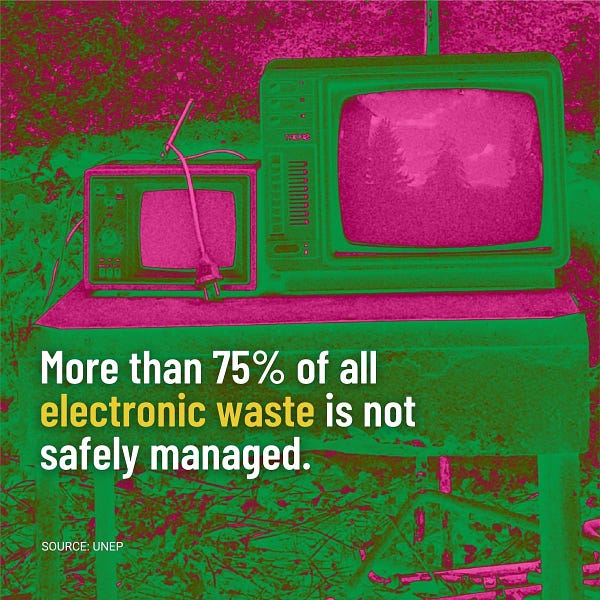28+ State AGs Urge Federal Right-To-Repair Legislation
Attorneys General wrote a letter urging Congress to pass right-to-repair bills. Also: China cracks down on Tesla. And: if you trade your house for a 50 year old RV, you better be prepared to fix it !
A bipartisan group of Attorneys General representing over half of the US states and Guam is urging Congress to pass right-to-repair laws.
In a letter addressed to the heads of the House Energy and Commerce Committee and the Senate Committee on Commerce, Science, and Transportation, the attorneys general urged Congress to pass “expansive Right to Repair legislation” covering automobiles, electronics and agricultural equipment.
“The Right-to-Repair is a bipartisan issue that impacts every consumer, household, and farm in a time of increasing inflation. It is about ensuring that consumers have choices as to who, where, when and at what cost their vehicles can be repaired,” the letter (PDF) reads.
“As State Attorneys General, we seek federal partners to provide necessary changes to the law that will better protect America’s consumers, particularly at this time of economic uncertainty.”
Signers include the state attorneys general from Alaska, Arizona, California, Connecticut, Delaware, Hawaii, Illinois, Indiana, Idaho, Louisiana, Maine, Maryland, Michigan, Minnesota, Nevada, New Mexico, Oregon, Pennsylvania, Rhode Island, South Carolina, South Dakota, Tennessee, Vermont, Washington and Wisconsin, as well as the attorneys general from the District of Columbia, Guam and the Northern Mariana Islands.
A number of right to repair laws are pending on Capitol Hill including:
The Right to Equitable and Professional Auto Industry Repair (REPAIR) Act would require automakers to give the same access to data and maintenance tools to independent repair shops that they do to their dealerships.
The Saving Money on Auto Repair Transportation (SMART) Act would limit the time for which automakers can enforce patents on collision repair parts against aftermarket suppliers. The attorneys argue that these changes would help lower repair prices and widen the options available to consumers.
Currently, Original Equipment Manufacturers (OEMs) in most industries can restrict access to these crucial parts and information, which results in higher costs for repairs and replacement parts. Those restrictions also make it more difficult for independent repair providers and small businesses to compete and limits the ability of consumers to repair their own vehicles. Together, those factors lead to less choice, increased costs and longer waits, encouraging consumers to replace- rather than repair broken goods. That impacts both the environment and consumer finances.
What AG’s are saying…
California Attorney General Rob Bonta emphasizes that passing legislation to prevent manufacturers from limiting independent repair would create a competitive marketplace for repairing various products, including vehicles and agricultural equipment. By allowing consumers to repair or replace their products on their own terms, it could reduce waste and drive down costs.
The Attorney General of Illinois argued that the monopoly on repair caused by OEMs results in increased prices for consumers and urge Congress to consider proposed legislation from the 117th Congress. Despite widespread public support for right-to-repair legislation, these bills were not passed.
Michigan Attorney General Dana Nessel sees passing right-to-repair legislation as a way to protect farmers and consumers by allowing small businesses to compete against closed systems favored by OEMs and to repair agricultural equipment at a reasonable cost.
“Consumers just want to fix their stuff, and attorneys general across the country are heeding their call,” said Nathan Proctor of US PIRG. “Right to Repair is common sense, and this incredible, bipartisan display of support shows, people from all across America support making it the law of the land.”

Other News
Tesla is facing scrutiny from Chinese regulators over quality and safety concerns related to its vehicles, including issues with battery fires, sudden acceleration, and other defects. This could potentially lead to a recall of tens of thousands of Tesla vehicles in China and harm the company's reputation and sales in the world's largest auto market. In the U.S., Tesla Inc was named in a pair of proposed class action lawsuits in March that accuse the company of unlawfully curbing competition for maintenance and replacement parts for its electric vehicles, forcing owners to pay more and wait longer for repair services in violation of U.S. anti-trust laws.
EU’s plan to reduce e-waste is criticized by environmentalists. Under the proposed rules, sellers would legally have to offer repairs for products covered by a guarantee, while manufacturers must offer repairs for certain technically repairable products. The EU also wants to introduce quality standards for repair services and create nationwide portals for consumers to find repair services and refurbished products. However, the rules will not immediately apply to smartphones and tablets, which are significant sources of e-waste. Campaign group Right to Repair said the proposals don't go far enough to address the cost of repairs.
Louis Rossmann has a video with his criticisms
Canada is eyeing USB-C standardization in it’s new budget. The nation’s 2023 federal budget includes plans to look into implementing a standardized charging port across the country to reduce electronic waste and save Canadians money. The move follows the EU's passing of legislation mandating the use of USB-C on electronic devices. The budget also mentions implementing a right-to-repair framework for home appliances and electronics in 2024 to reduce high repair fees and promote repairing over buying new products.
Wind turbine repair is expected to create 20,000 jobs in the UK says the Coalition for Wind Industry Circularity (CWIC). They also argue that this expansion of wind-power will prevent 800,000 tonnes of parts from being scrapped by repairing and re-using broken wind turbines. A UK supply chain capable of refurbishing ten parts of a single turbine could access a European-wide market worth almost £10bn to UK GDP between 2025 and 2035.
Vermont debates repair legislation that would require agricultural equipment manufacturers like John Deere, Tigercat or Caterpillar to offer equipment parts, manuals, codes and diagnostics to owners at a fair market value, with trade organizations claiming these items are intellectual property or qualify as trade secrets and opposition to the bill ranging from constitutional objections to concerns that farmers and loggers could override emissions controls or safety features built into the equipment.
Repair Cafes are attracting younger volunteers interested in sustainable solutions and fighting the throw-away mentality. Repair Cafes in Amsterdam have reported an increase in younger volunteers, who bring skills and enthusiasm to the teams that are more traditionally staffed by older members.
83% of e-waste produced globally is not collected, and 53.6 million metric tons of e-waste are produced annually worldwide, the World Economic Forum says this is a major missed opportunity for the circular economy. Although incentives or regulations may be required to increase e-waste recycling rates, concerns around sensitive information contained in electronic products need to be addressed. E-waste represents the fastest growing waste stream globally, but separating and sorting components for recycling can be labor intensive.
If you own a 50 year old RV, you must believe you can fix it, Scott Gilbertson writes in Wired of his decision to trade a suburban home for him and his family for a 1969 Dodge Travco, a half century old RV. “I bought it out of a muddled sense of self-reliance born of stubbornness and ideals, I wanted them to know that anything worth fixing can be fixed, and anything that can't be fixed isn't worth having. But sitting there in the heat of the California sun on Highway 168 that afternoon, the bus felt more like a giant check my ego had written that my fumbling fingers and tools could not cash.”
Fast fashion has made people view clothing as disposable, and the constant need for new outfits and fresh content for social media has led to a significant amount of clothes ending up in landfills. Sustainability-focused stylist Julia Gall and fashion journalist Alyssa Hardy have outlined steps to take to start a fast fashion detox:
Take inventory of your wardrobe.
Know what you do and don't like.
Shop your wardrobe.
Choose sustainable and ethical brands.
Buy with intention and care.





